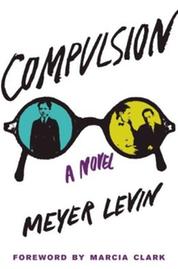Judd Steiner and Artie Strauss are part of the up-and-coming elite of the Jewish community in 1920s Chicago. Their futures are bright, every conceivable advantage in life at their fingertips: wealth, intelligence, status. Genius introvert Judd is drawn to athletic Artie's charisma; they become best friends at the University of Chicago. The pair also share a darker secret: an obsession with Friedrich Nietzsche's theoretical übermensch, a super man unbound by society's petty ethics. Judd and Artie plot to prove their superiority by murdering a random neighborhood boy.
Sid Silver is a fellow student and fraternity brother of Judd and Artie. As a rookie journalist at the Chicago Globe, Sid investigates the murder of Paulie Kessler, which shocks Chicago into an obsessive hunt for the boy's killers. Judd and Artie crack under police interrogation, avoiding the death penalty only by a novel legal defense. Thirty years later, Artie dead in prison and Judd up for parole, Sid, still a reporter, interviews Judd, whose parole case may depend on Sid's article.
Compulsion is based on the infamous Leopold and Loeb case, considered the "crime of the century," in which a pair of privileged Jewish University of Chicago students killed a 14-year-old boy in 1924 just to prove their intellectual superiority. Author Meyer Levin was a reporter and fellow University of Chicago student at the time. First published in 1956, Compulsion found commercial and critical success (it has sold more than 1.15 million copies) and paved the way for other nonfiction novels like Truman Capote's In Cold Blood. In 1959, Compulsion was adapted into a film featuring Orson Welles.
In the foreword to this new edition, Marcia Clark, head prosecutor in the O.J. Simpson case and author of four Rachel Knight novels, said Compulsion "raises issues pertaining to society and our justice system--such as popular biases, groupthink, and the inherent, perhaps unfixable, flaws in our legal system--that are as much in evidence today as they were back then."
 |
|
| Meyer Levin | |
In a new introduction, Meyer's son, poet and essayist Gabriel Levin, touches on the novel's groundbreaking depiction of homosexuality: "At a distance of close to a century from... when the crime took place, one cannot help being impressed by the candor with which homosexuality is treated. Indeed, one of the battles waged in court (if not the battle) between the state attorney and the defense lawyers lies precisely in the former's vilification of homosexuality... and the latter's appeal to a broader understanding of psychopathology. This may be a far cry from our own perceptions of homosexuality... but the general display of tolerance... may well have contributed to the first, tentative signs of normalization of gay relations in America in the mid-fifties."
Meyer Levin admitted a sort of kinship with Leopold and Loeb as another "young, intellectual Jew," but one who made very different choices: "I... had turned my precocious energy into accomplishment; they, the rich south siders, turned the same qualities toward destruction." In his introduction, Gabriel Levin notes that "this wary kinship... would provide my father with the analytic and sympathetic tools [to enter] the mind of Judd Steiner."
After graduating from the University of Chicago, Meyer became a reporter for the Chicago Daily News. He wrote 20 fiction and nonfiction books, including a novelization of the life of Frank Lloyd Wright, The Architect, published in 1981, the year he died.
Digital galleys of Compulsion are available through Edelweiss.


